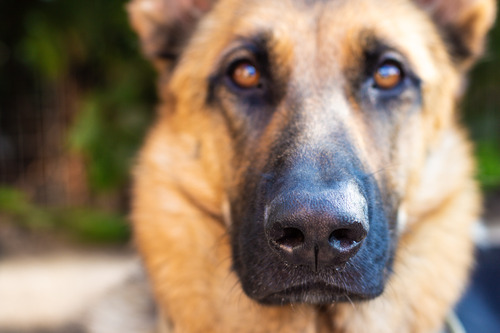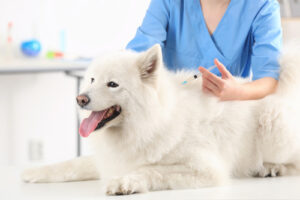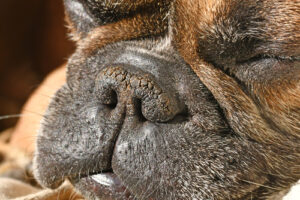As our canine companions age, their bodies go through many changes, some of which can be quite concerning for pet owners. One common issue is a senior dog’s nose dripping. Understanding the possible causes of this condition and knowing when to seek veterinary care can help ensure your senior dog remains healthy and comfortable. At World of Animals Veterinary Hospital, we are here to provide the best care for your senior pets.
Common Causes of a Senior Dog’s Nose Dripping
There are several reasons why your senior dog might experience a dripping nose. Some of these causes are relatively benign, while others may require prompt veterinary attention. Below, we’ll explore some common causes.
Allergies
Allergies are a frequent cause of nasal discharge in dogs of all ages, including seniors. Environmental allergens such as pollen, dust, mold, and even certain foods can trigger allergic reactions. Symptoms of allergies in dogs include sneezing, itching, watery eyes, and a runny nose. If your senior dog’s nose is dripping, it might be worth considering potential allergens in their environment.
Infections
Infections, both bacterial and viral, can lead to a runny nose in senior dogs. Canine infectious respiratory disease complex (CIRDC), also known as kennel cough, is a common viral infection that causes nasal discharge. Bacterial infections, such as those caused by Bordetella bronchiseptica, can also lead to similar symptoms. If your senior dog’s nose dripping is accompanied by other signs of illness, such as coughing, lethargy, or loss of appetite, it’s important to contact us for a thorough examination.
Dental Issues
Dental problems can also result in nasal discharge. Infections or abscesses in the teeth or gums can cause a drip from the nose, especially if the roots of the upper teeth are affected. This is because the nasal passages and oral cavity are closely connected in dogs. Regular dental check-ups and cleanings are essential, particularly for senior dogs, to prevent dental issues that might lead to a runny nose.
Serious Health Conditions Linked to Nasal Discharge
While some causes of a dripping nose in senior dogs are relatively minor, others can be indicative of more serious health conditions. It’s crucial to be aware of these possibilities and seek veterinary advice if you notice persistent or concerning symptoms.
Nasal Tumors
Nasal tumors are a more serious cause of nasal discharge in senior dogs. These growths can be benign or malignant and often require medical intervention. Symptoms of nasal tumors include persistent nasal discharge (which may be bloody), facial swelling, difficulty breathing, and sneezing. If your senior dog exhibits these signs, it’s important to contact us for an evaluation and appropriate diagnostic tests.
Chronic Rhinitis
Chronic rhinitis, an inflammation of the nasal mucous membranes, can cause ongoing nasal discharge. This condition may be due to long-term infections, allergies, or irritants. In senior dogs, chronic rhinitis can be particularly problematic, as their immune systems are not as robust as they once were. Management of this condition often involves addressing the underlying cause and providing supportive care to alleviate symptoms.
When to Seek Veterinary Care
Determining when to seek veterinary care for your senior dog’s nose dripping can be challenging. However, certain signs indicate that it’s time to make an appointment.
Persistent Symptoms
If your senior dog’s nose dripping persists for more than a few days or is accompanied by other symptoms such as coughing, sneezing, or lethargy, it’s time to consult a veterinarian. Persistent nasal discharge can be a sign of an underlying condition that needs medical attention.
Changes in Discharge
The color and consistency of your senior dog’s nasal discharge can provide important clues about their health. Clear, watery discharge is often less concerning, while thick, yellow, green, or bloody discharge can indicate infection or more serious issues. If you notice any changes in your dog’s nasal discharge, it’s best to seek veterinary advice.
Breathing Difficulties
Difficulty breathing is always a cause for concern. If your senior dog is struggling to breathe, has noisy breathing, or appears to be in distress, immediate veterinary care is essential. Breathing difficulties, combined with nasal discharge, can indicate a serious health problem that requires prompt treatment.
How World of Animals Veterinary Hospital Can Help
At World of Animals Veterinary Hospital, we understand the unique needs of senior dogs and are committed to providing the best possible care for your pet. Our experienced veterinarians are equipped to diagnose and treat a wide range of conditions that may cause nasal discharge.
Comprehensive Diagnostics
Our veterinary team will perform a thorough examination and may recommend diagnostic tests such as blood work, X-rays, or nasal endoscopy to determine the cause of your senior dog’s nose dripping. These tests help us identify underlying conditions and develop an effective treatment plan.
Tailored Treatment Plans
Once we have identified the cause of your senior dog’s nasal discharge, we will work with you to create a tailored treatment plan. This may include medications to address infections, allergy management strategies, or even surgical intervention if necessary. Our goal is to ensure your senior dog receives the best care to improve their quality of life.
Ongoing Support and Care
Managing a senior dog’s health requires ongoing support and care. Our team at World of Animals Veterinary Hospital is here to provide guidance and support throughout your pet’s senior years. From regular check-ups to specialized treatments, we are dedicated to keeping your senior dog healthy and happy.
Preventive Measures for Senior Dogs
Prevention is always better than cure, especially when it comes to the health of your senior dog. Here are some preventive measures to help keep your senior dog’s nose from dripping and maintain their overall health.
- Regular Veterinary Check-ups: Regular veterinary check-ups are crucial for senior dogs. These visits allow us to monitor your dog’s health, catch any potential issues early, and provide preventive care to keep them healthy. Routine check-ups can help prevent many of the conditions that cause nasal discharge.
- Proper Dental Care: Dental care is often overlooked but is essential for preventing nasal discharge caused by dental issues. Regular brushing, dental chews, and professional cleanings can help maintain your senior dog’s oral health and prevent infections that could lead to a runny nose.
- Allergy Management: If your senior dog suffers from allergies, managing their environment and diet can significantly reduce symptoms. Identifying and avoiding allergens, providing hypoallergenic bedding, and using air purifiers can help minimize your dog’s exposure to potential triggers.
Prioritizing Your Senior Dog’s Health and Comfort
A senior dog’s nose dripping can be caused by a variety of factors, from minor irritants to serious health conditions. Understanding the potential causes and knowing when to seek veterinary care is crucial for maintaining your senior dog’s health and well-being. At World of Animals Veterinary Hospital, we are committed to providing the best care for your senior pets. If your senior dog’s nose is dripping, contact us to schedule an appointment and ensure they receive the attention and treatment they need.





